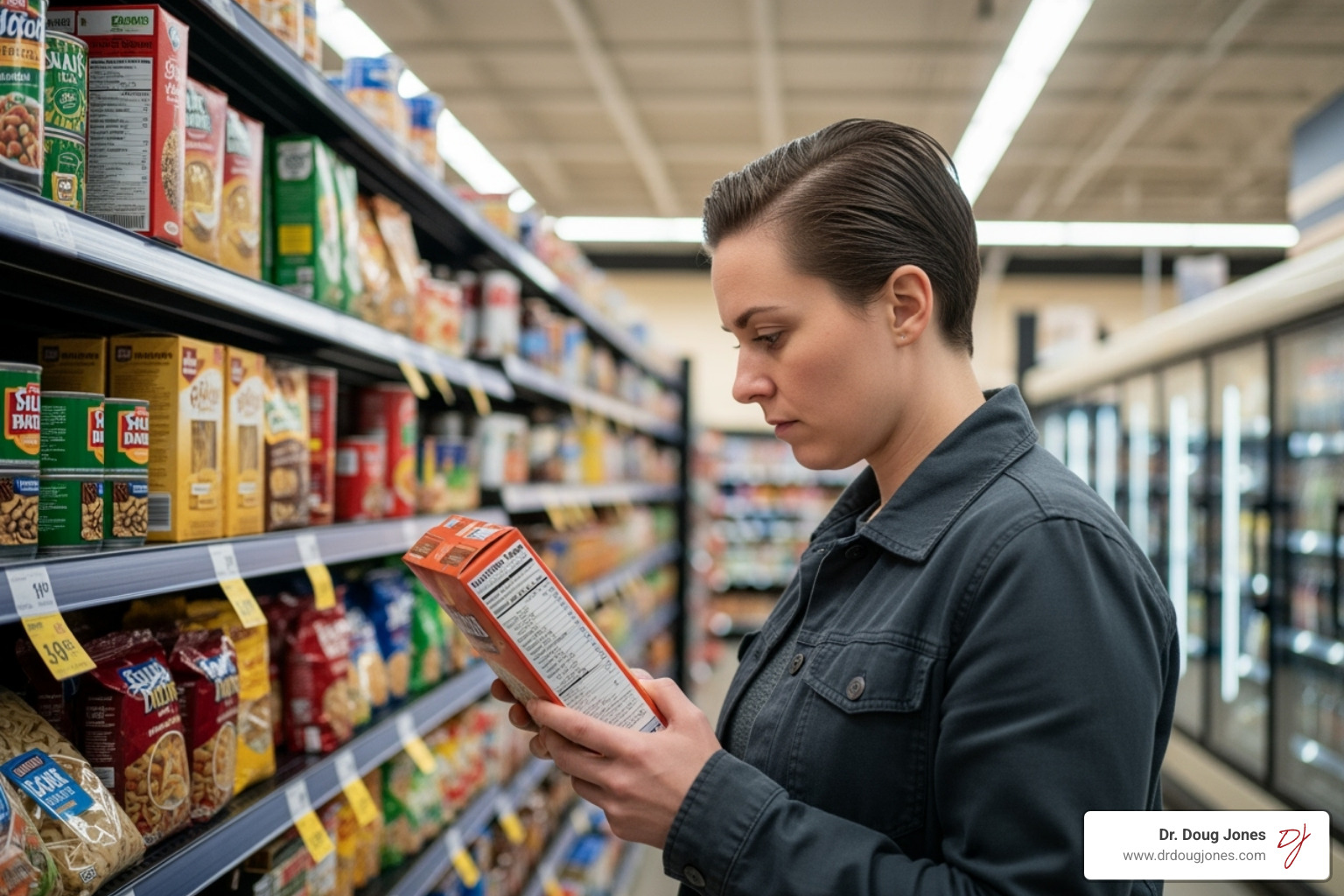Don't Go It Alone: Why You Need a Food Allergy Expert
Don't guess! A food allergy expert provides accurate diagnosis, personalized management & peace of mind. Find your qualified specialist today.

Why Professional Guidance Matters for Food Allergies
A food allergy expert is a board-certified allergist or immunologist who specializes in diagnosing and managing immune system reactions to food. These specialists use advanced testing, create personalized treatment plans, and provide emergency action plans to keep you safe.
What a food allergy expert can do for you:
- Accurate diagnosis through skin tests, blood work, and oral food challenges
- Distinguish between true allergies, intolerances, and related conditions
- Prescribe epinephrine and train you when and how to use it
- Create emergency action plans for anaphylaxis
- Guide safe food introduction for children at risk
- Offer new treatments like oral immunotherapy and biologics
- Help you steer daily life, from reading labels to eating out safely
Food allergies affect millions of Americans, with reactions ranging from uncomfortable to life-threatening. Food allergy is the leading cause of anaphylaxis outside hospitals, and nine major allergens account for about 90% of all reactions: milk, eggs, peanuts, tree nuts, fish, shellfish, wheat, soy, and sesame.
A common point of confusion is the difference between a food allergy and a food intolerance. A true food allergy involves the immune system and can trigger anaphylaxis—a severe, whole-body reaction. A food intolerance affects the digestive system and, while uncomfortable, is not life-threatening.
This is why self-diagnosis is risky. Without proper testing, you might avoid foods unnecessarily or, worse, underestimate a serious allergy. There are many unvalidated tests that are marketed that complicate things more when you try to self-diagnose. Even validated tests carry a lot of nuance and there must be an in-depth understanding of what they mean and don't mean to properly order and interpret the results. You want a specialist in A/I (Allergy/Immunology) not AI.
I'm Dr. Doug Jones, a board-certified immunologist and founder of GAIN—Global Allergy Immune Network. As a food allergy expert, I specialize in complex immune conditions and have helped hundreds of patients move from confusion and fear to clarity and confidence.

Key food allergy expert vocabulary:
Understanding the Basics: Food Allergy vs. Intolerance
Many people use "food allergy" and "food intolerance" interchangeably, but they are different conditions. Understanding this distinction is key to knowing whether you're dealing with something uncomfortable or potentially life-threatening.
A true food allergy is an immune system reaction. Your body mistakes a food protein for a threat and produces Immunoglobulin E (IgE) antibodies. This triggers a rapid, multi-system reaction affecting the skin, respiratory, cardiovascular, and digestive systems. Even a tiny amount of the food can cause symptoms within minutes.
Food intolerance, on the other hand, is a digestive system issue. It occurs when your body struggles to break down certain foods, like in lactose intolerance, or due to sensitivities to additives. The good news is that intolerances are not life-threatening. You won't experience anaphylaxis—the severe, whole-body allergic reaction that can be fatal. Often, small amounts of the problematic food can be tolerated.
Then there's celiac disease, a serious autoimmune condition where eating gluten damages the small intestine. It involves the immune system but is not an IgE-mediated allergy and does not cause anaphylaxis.
A food allergy expert can help you sort through these distinctions with proper testing. Here's how the two main conditions compare:
FeatureFood AllergyFood IntoleranceMechanismImmune system reaction (IgE antibodies involved)Digestive system issue (no immune involvement)SeverityCan be severe or life-threatening (anaphylaxis)Generally less serious, uncomfortableSymptomsHives, swelling, difficulty breathing, vomitingBloating, gas, diarrhea, stomach cramps, headachesOnsetUsually immediate (minutes to 2 hours)Can be delayed (hours to days)QuantityEven tiny amounts can trigger a reactionSmall amounts may be toleratedExamplesPeanut allergy, milk allergyLactose intolerance, gluten sensitivityTreatmentStrict avoidance, epinephrine for emergenciesDietary adjustments, enzyme supplements
Key Symptoms of a True Food Allergy
Allergic reactions usually appear within minutes to two hours. Mild to moderate symptoms include hives and rash, a tingling mouth, swelling of the lips or tongue, nasal congestion, and dizziness.
A severe reaction, anaphylaxis, is a medical emergency. Symptoms include difficulty breathing, wheezing, throat swelling, vomiting, a rapid but weak pulse, a drop in blood pressure, and potential loss of consciousness. Anaphylaxis requires immediate treatment with epinephrine. Sometimes symptoms improve and then return hours later (a biphasic reaction), which is why emergency medical care is crucial.
Common Signs of a Food Intolerance
Food intolerance symptoms are primarily digestive and can include bloating, gas, diarrhea, stomach cramps, nausea, and headaches. Unlike allergies, symptoms are often delayed and dose-dependent—a small amount of the food may cause no issues, while a larger portion does. While these symptoms can impact your quality of life, they are not dangerous.
The Critical Role of a Food Allergy Expert in Diagnosis and Management

Living with food allergies can feel overwhelming, which is why working with a food allergy expert is so important. An accurate diagnosis is the first step. Without it, you're either restricting your diet unnecessarily or putting yourself at risk. An expert can distinguish between a true allergy, an intolerance, and other conditions.
Once diagnosed, we build a personalized treatment plan around your specific allergens and lifestyle. This isn't a generic pamphlet; it's ongoing management that adapts as your life changes. My goal is to improve your quality of life and reduce the anxiety that shadows every meal. Using a functional and integrative medicine approach, I look at your entire system—immune health, gut health, and stress levels—to find lasting relief.
How a Food Allergy Expert Diagnoses Your Condition
Getting the right diagnosis is like detective work, piecing together clues from multiple sources.
- Medical History and Symptom Diary: Diagnosis begins with a detailed medical history to understand your symptoms, suspected foods, and family history. A symptom diary, where you track what you eat and how you feel, can reveal crucial patterns.
- Skin-Prick Tests: These tests involve placing a tiny amount of an allergen on the skin and making a small prick. A raised, itchy bump appearing within 15 minutes suggests a possible allergy.
- Blood Tests: These tests measure IgE antibodies in your bloodstream. However, both skin and blood tests show sensitization, not necessarily a clinical allergy. We never diagnose based on testing alone. Results for one food cannot be equated to another food, either. There is nuance in how these tests must be interpreted.
- Oral Food Challenges: The gold standard for diagnosis. In a safe clinical setting, you consume gradually increasing amounts of the suspected food under close monitoring to definitively confirm or rule out an allergy.
- Elimination Diets: This involves removing suspected foods for a few weeks and then carefully reintroducing them. This should always be done under professional guidance to avoid nutritional deficiencies and misinterpreting results.
Developing Your Personalized Management Plan
Once we have a diagnosis, we build your safety net so you can live your life as fully as possible.
- Allergen Avoidance: The foundation of management is strict allergen avoidance. We work together to identify all the hidden forms your allergen can take in foods, medications, and cosmetics.
- Reading Food Labels: In the U.S., the top nine allergens must be clearly listed. However, "may contain" warnings for cross-contamination are voluntary, so vigilance is key. I teach you prevention strategies for home and restaurants, like the fact that hand sanitizer doesn't remove food allergens—only soap and water will do.
- Emergency Action Plan: A written emergency action plan is vital for those at risk of anaphylaxis. It details symptoms and steps to take, including when to use epinephrine and call for help. This plan should be shared with family, friends, and colleagues.
- Epinephrine Training: Epinephrine auto-injector training is essential. Epinephrine is the first-line treatment for anaphylaxis. You should carry two doses and use it without hesitation if you suspect a severe reaction, then call 911, even if you feel better.
Navigating Daily Life with Expert Guidance
Living with food allergies doesn't mean living in fear. With the right strategies and the support of a food allergy expert, you can steer daily life with confidence.

Eating Out and Traveling
With planning, you can enjoy dining out and traveling. When eating out, research menus online, call ahead, and communicate your allergies clearly to the staff. Use a "chef card" to list your allergens, ask about cross-contamination, and always carry your epinephrine.
For travel, consult your expert for medication, contact airlines about their policies, and bring translated chef cards for international trips. Research local healthcare and pack safe, non-perishable snacks.
Managing Allergies at School and in Social Life
For school, ensure a written emergency action plan is in place, epinephrine is accessible, and staff are trained. Teach older children to self-advocate and use their auto-injector.
In social situations, inform friends and family about your allergies, wear medical alert jewelry, and consider joining a support group. Organizations like Food Allergy Canada offer valuable community resources. Open communication is key in all relationships.
Common Allergens and Prevention Strategies
The top nine allergens account for 90% of reactions: milk, eggs, peanuts, tree nuts, soy, wheat, fish, shellfish, and sesame. You might also experience Oral Allergy Syndrome (OAS), where an allergy to pollen causes an itchy mouth after eating certain raw fruits or vegetables. An expert can distinguish this from a true food allergy.
Can Food Allergies Be Prevented or Outgrown?
For years, parents were told to delay introducing allergens. Research has flipped that advice. Current guidelines recommend introducing allergenic foods like peanuts around 4-6 months of age for infants, especially those at high risk, as this can significantly reduce the chance of developing an allergy. This should always be done under medical supervision.
As for outgrowing allergies, it depends. Children often outgrow allergies to milk, egg, soy, and wheat, while allergies to peanuts, tree nuts, and seafood are typically lifelong. Adult-onset allergies also tend to be permanent. An expert can monitor for changes and discuss new treatments like oral immunotherapy (e.g., Palforzia) or biologics (e.g., Xolair), which are showing promise in reducing allergic reactions.
Frequently Asked Questions about Finding a Professional

Finding the right help is a critical step. Managing food allergies isn't something you should do alone, as the immune system is complex and reactions can be unpredictable. Getting personalized guidance from a qualified food allergy expert can transform your experience from worry to confident living.
What kind of doctor is a food allergy expert?
A food allergy expert is a board-certified allergist or immunologist. These medical doctors complete extensive fellowship training in allergy and immunology after their residency. For children, a pediatric allergist has specialized expertise in the unique challenges young patients face. Board certification is important because it signals a commitment to maintaining the highest standards of care and staying current with the latest research.
As a board-certified immunologist, my approach goes beyond traditional allergy care, using functional and integrative medicine to look at the whole picture of your health.
When should I see a food allergy expert?
Knowing when to seek help can make all the difference. You should see a food allergy expert if you:
- Suspect a food reaction, even if it seems mild.
- Are considering an elimination diet to identify problem foods.
- Need to manage severe or multiple diagnosed allergies.
- Experience persistent digestive issues, skin rashes, or respiratory problems that you think are food-related.
- Want to re-evaluate a previously diagnosed allergy, as some can be outgrown.
- Develop new food allergy symptoms as an adult.
Don't wait for a severe reaction. Early intervention makes managing food allergies safer and less stressful.
How can I find a qualified allergist?
Finding a qualified food allergy expert is straightforward. Start with online directories from professional organizations like the Food Allergy Support Team (FAST) at fastoit.org, the American Academy of Allergy, Asthma & Immunology (AAAAI) or the Canadian Society of Allergy and Clinical Immunology (CSACI).
You can also ask your primary care physician for a referral and verify an allergist's credentials online. When you contact an office, ask about their specific areas of focus to find someone whose expertise aligns with your needs.
Taking this step is an investment in your health and peace of mind. If you're ready to explore a functional medicine approach, I invite you to learn more about how personalized care can make a difference. Inquire about a consultation with me, and let's work together toward your lasting relief.
Conclusion
You now understand that food allergies aren't something to steer alone. The stakes are real, from the daily task of reading labels to the risk of anaphylaxis. But with the right food allergy expert by your side, you can move from fear and confusion to confidence and clarity.
We've covered how a food allergy expert provides an accurate diagnosis, creates a personalized management plan, and empowers you to steer daily life safely. From distinguishing allergies from intolerances to developing an emergency action plan, expert guidance is key. When you understand your triggers and have a clear plan, the anxiety that often shadows food allergies begins to lift.
As a board-certified immunologist and founder of GAIN—Global Allergy Immune Network, I've dedicated my practice to redefining complex immune challenges. My functional and integrative medicine approach looks beyond surface symptoms to understand the root causes, empowering you with lasting relief.
Food allergies may be part of your story, but they don't have to define it. With expert guidance and personalized care, you can live fully and safely.
If you or someone you love is struggling with food allergies or complex immune conditions, I invite you to take the next step toward clarity and confidence.
Inquire about a consultation and let's steer your journey together with expert guidance and compassionate care.

